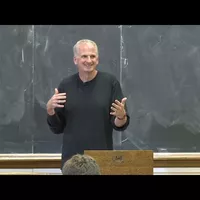Class 3: Geography and Ancient History (5)
in one way or another.
And that moving is associated with the changing of meanings.
And sometimes it's associated with a change in meanings
in a positive sense.
This is just the very last thought.
But I was really struck,
I mean, I'm not trying to make a happy story of this,
because of course it's not a happy story,
but I was really struck by how,
when people talked about all of this movement,
whether it was the President himself,
or whether it was some of the soldiers I talked to,
or whether it was some of the people in villages
that I talked to, when they talked about all this movement,
they had interpretations of it,
that like this in some way shows who we are.
The fact that we went away and came back,
The fact that we were able, or have already-
a lot of people have already rebuilt their houses,
the fact that we rebuilt,
the fact that we got back to Kharkiv,
the fact that Zelensky stayed,
that these things say something about us, about who we are.
We can be pushed, we can be pulled,
but then where we choose to be in the end,
says something about us.
That we choose to fight this war,
that we choose to help the people fighting this war,
that we choose to make it through somehow,
says something about us.
And so in that sense,
like this thing that people are talking about
as the formation of a nation, I think, is not quite right.
The nation was already there.
But how people think about their nation,
and particularly what they think it means to be free,
and what it's worth sacrificing about,
you can also connect that to space.
In fact, I guess my point would be,
you almost have to connect it to space.
It's hard to imagine people having a story about themselves
which involves risk and values,
which doesn't also in some way involve space.
And that's where I'm gonna leave it. Thank you.
(gentle chimes)

